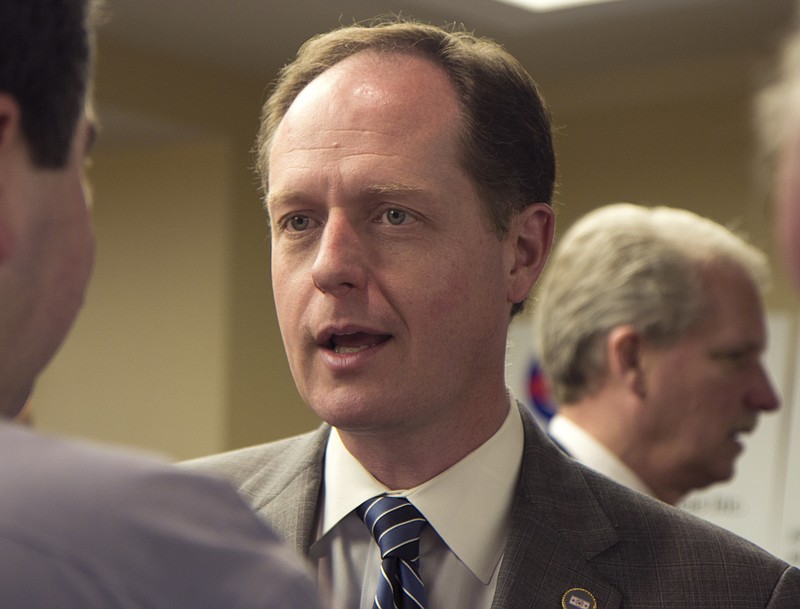NASHVILLE -- Tennessee senators today approved a controversial bill that allows counselors and therapists to refuse to treat would-be patients on grounds they violate the professionals' "sincerely held religious belief."
Advocates said they were protecting the therapists' religious rights. Opponents, however, raised concerns the could harm people needing help in times of crisis who happen to be gay, bisexual, lesbian transgender or else have a different religious faith.
The bill, sponsored by Sen. Jack Johnson, R-Franklin, passed 27-5. It requires a professional refusing to provide treatment to provide a referral to someone who will.
Rep. Dan Howell, R-Georgetown, the House sponsor, has put the bill on notice to be heard next week in a subcommittee.
The two lawmakers' bill wades into the dispute over a 2014 code of ethics adopted by the American Counseling Association. It says counselors and marital therapists can no longer refer patients or would-be clients to another professional because of their beliefs.
"This is problematic to dozens if not scores of counselors across our state," Johnson said.
"Our ultimate goal is for people to get the help that they need," Johnson said. "The code of ethics existed in its prior from time immemorial ... and I'm not aware of a problem prior to the amended code of ethics in 2014. All we're doing is reverting back to that code of ethics, which seemed to work very well for many, many years."
While Johnson never mentioned homosexuality, abortion or persons of different religious faiths, Sen. Jeff Yarbro, D-Nashville, and Minority Lee Harris, D-Memphis, said that was clearly the intent.
They said referrals in rural communities would be particularly problematic because of the scarcity of such professionals.
Yarbro pushed an amendment that would exclude referrals of persons who are suicidal or potentially dangerous to others.
He said the ACA's policy requires therapists to "pay special attention to situations where an individual may be suicidal or may have an intent to harm themselves or others. So this [amendment] would be in the event if you had someone who was, you know, think of the situation where we've had school shootings."
"They would not be able to abandon that patient or that person seeking care on the basis of them being of a different religion or having a different set of philosophical beliefs," Yarbro said.
Johnson didn't object to the amendment and it was adopted on a 32-0.
But the Republican drew the line at another Yarbro amendment that sought to prevent referrals in the case of someone involved in domestic abuse.
Johnson said in cases of domestic abuse or potential violence "that becomes a matter for law enforcement."
Three Republican physicians squared off over Johnson's bill with Sen. Mark Green of Clarksville noting that as an emergency room physician he is allowed to refer a patient seeking a "morning after" pill to block her pregnancy to another doctor.
But Sen. Steve Dickerson, R-Nashville, told colleagues that when he was a medical resident during the early days of the AIDS outbreak, some of his fellow students told their instructor they were worried about dealing with such patients because little was known at the time about various ways the disease was transmitted.
"We were told we had a choice to be here, but if we didn't want to treat infectious patients, we should walk out the door right now," recalled Dickerson who voted against the bill.
Sen. Joey Hensley, R-Hohenwald, another doctor, said "any professional should have the prerogative to refer a patient to someone else if they feel they cannot adequately treat a patient whose lifestyle they believe is causing the problem."
Yarbro told the Times Free Press his amendment dealing with suicidal or potentially violent clients came about in part because of last summer's deadly shooting spree in Chattanooga where 24-year-old Mohammad Youssef Abdulazeez fatally shot five U.S. Marine and Naval reservists.
Abdulazeez's family say their son had had mental health problems. The FBI later classified it as inspired in part of Islamist extremist social media propaganda.
The Johnson bill's language states: "No counselor or therapist providing counseling or therapy services shall be required to counsel or serve a client as to goals, outcomes, or behaviors that conflict with a sincerely held religious belief of the counselor or therapist; provided that the counselor or therapist coordinates a referral of the client to another counselor or therapist who will provide the counseling or therapy."
